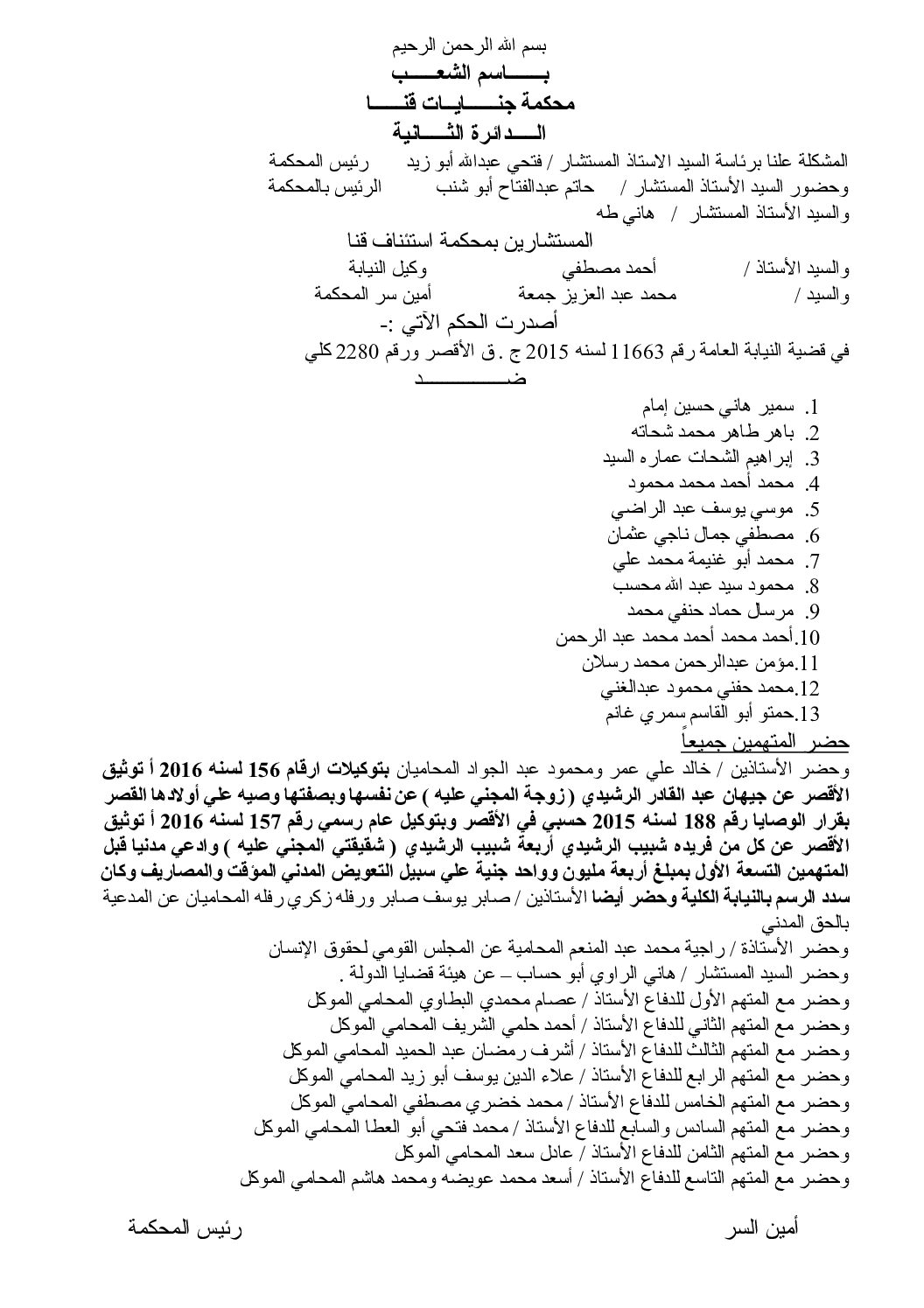Criminal Justice | ECESR Challenges Fund Seizure Decision against Haitham Mohammadayn and Others

ECESR challenged the fund seizure and prevention of disposition decision issued against Haitham Mohammedan, Amr Ali, Hisham Fouad and Khaled Sayed
The court is originally incompetent to make such decisions
Flawed decisions by incompetent courts are immediately enforced against dissidents, and final verdicts by higher courts are not abided by
Lawyers at the Egyptian Center for Economic and Social Rights (ECESR) filed 4 challenges this morning before the State Council against the Standing Committee for Surveying and Management of Brotherhood Funds, chaired by the Justice Minister Assistant, for the fund seizure decision made against 112 individuals, including Haitham Mohammadayn, Amr Ali, Hisham Fouad and Khaled Sayed. ECESR claimed for repealing the decision issued to form the above-mentioned Committee and canceling the fund seizure decisions.
The ECESR confirms that the decision to form the Committee is null and void and was made without following the provisions of the law; it is based on misunderstanding of the substance of urgent matters ruling and its effects, since its enforcement is inconsistent with the provisions of the Constitution. ECESR condemns these measures taken against even the opponents of the former Muslim Brotherhood government. ECESR calls for the Administrative Court to promptly settle such cases since they affect the public rights and freedoms of citizens. Needless to say, deciding on such cases immediately achieves the due process of justice that we all anxious for.
The ruling of the Urgent Matters Court is limited to determining only the temporary claimed measure without exceeding its limits to deciding on the substance of the disputed right.
It seems that the executive branch is dealing selectively with court rulings handed down against decisions of administrative nature. The rulings against dissidents are enforced once issued by a lower court, even if incompetent. To make things worse, these court decisions were handed down in cases filed by irrelevant claimants. The executive is very selective: sometimes they abide by a ruling made by an urgent court, which is incompetent to decide on the case, and sometime they refuse the enforcement of a verdict issued by the Higher Administrative Court, the apex of the hierarchy of the administrative judiciary. In both cases, decisions would be made to form committees either to implement the court ruling or to circumvent its enforcement, according to their whim.
For instance, the final verdict of ”My City” handed down in 2010 under Nazeef government was ignored, along with many other verdicts of the invalidity of the public sector privatization contracts won by the ECESR. Paradoxically, the former Prime Minister Hisham Qandil was sentenced to jail for failing to enforce a court ruling handed down by the Higher Administrative Court in favor of returning Tanta Flax company to the public sector, and then the current Prime Minister ordered re-privatization of the same company for the same investor with the same aspects of corruption mentioned in the court verdict, but this time with impunity.
Final verdicts by the Higher Administrative Court haven’t been abided. Companies like Nubaseed and Tanta Flax were returned to the investor, contrary to the final verdict and in spite of the prison sentence held against the former Prime Minister Hisham Qandil for failing to implement the same ruling.
The Egyptian State Council has laid many judicial principles across a great history of verdicts against defective administrative decisions either for violating the law, being illegal, being issued by incompetent court, or not intended for the common good. In spite of this great history, the Justice Ministry Commission has made an absurd and weird decision carrying all the above-mentioned defects. The Standing Committee for Surveying and Management of Brotherhood Funds issued a fund seizure decision against 112 individuals, including Haitham Mohammadayn and Hisham Fouad (Revolutionary Socialists), Amr Ali (April 6), Khaled Sayed (activist) and many others who do not belong to the Brotherhood. In spite of being opponents to the Muslim Brotherhood, they were prevented from disposing of any of their properties or money.
This decision has been issued in violation of the provisions of the newborn Constitution. It encroaches on the concept of property as enshrined in the Constitution. On the other hand, it was handed down by an incompetent court, the Urgent Matters Court. Needless to say, the ruling of the Urgent Matters Court is limited to determining only the temporary claimed measure without exceeding its limits to deciding on the substance of the disputed right. Further, the defendants were denied access to their lawyers, not to mention the ruling of the Urgent Matters Court which encroached on the jurisdiction of the State Council Courts to hear such cases.

